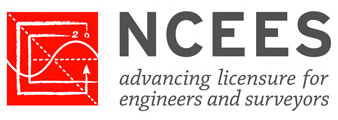Future Proof Your Career: Professional Engineering and Surveying Licensure
How do you build a hand-washing station where there is no water?
How do you prevent hackers from driving autonomous cars?
How do you anticipate the needs of a city before it needs them?
The engineering field (and the world at large) is only getting more complicated by the day. And while you can’t predict the future, you can prepare for it. Take the next step in future proofing your career by pursuing your professional engineering or surveying license.
In the United States, licensure for the engineering and surveying professions is regulated by each state. If you are interested in pursuing licensure you are encouraged to check the requirements in the state or territory where you plan to practice, as the requirements vary.
Steps to Becoming a PE
While each state licensing board has its own laws regarding engineering licensure, there is a general three-step process for licensure candidates:
Education
Generally, engineering licensing boards require PE candidates to have an EAC/ABET-accredited bachelor’s degree. Check the requirements of your state licensing board. Each state licensing board has varying educational requirements.
Exams
Licensure candidates typically must pass the Fundamentals of Engineering (FE) exam and the Principles and Practice of Engineering (PE) exam.
Experience
Most states require four years of acceptable, progressive, and verifiable work experience in the industry.
Steps to Becoming a PS
While each state licensing board has its own laws regarding surveying licensure, there is a general three-step process for licensure candidates:
Education
Complete the appropriate level of education in your state. Check the requirements of your state licensing board. Some require only a high school diploma, while many others require a degree from an accredited four-year surveying program.
Exams
Licensure candidates typically must pass the Fundamentals of Surveying (FS) exam, the Principles and Practice of Surveying (PS) exam, and a state-specific exam.
Experience
Most states require four years of acceptable, progressive, and verifiable work experience under the supervision of a licensed surveyor.
EWB-USA has partnered with NCEES on a mini podcast series to showcase the work of professionally licensed engineers in humanitarian engineering.
Check out the series!
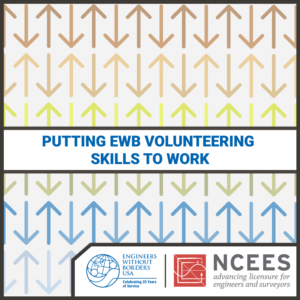
Episode 1: Putting EWB-USA Volunteering Skills to Work
In this episode, EWB-USA students and industry representatives explain why volunteering skills matter in today’s workforce, the pathway and benefits of engineering licensure, and how licensure protects the public.
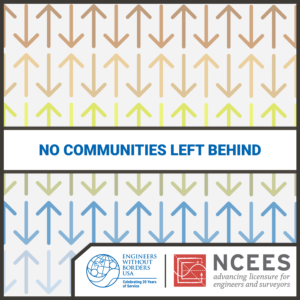
Episode 2: No Communities Left Behind
In this episode you will hear from a panel of humanitarian engineering and community development practitioners and professionals about their practice in the United States.
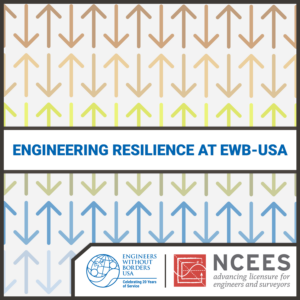
Episode 3: Engineering Resilience at EWB-USA
In this episode you will hear from engineers talking about their approach to engineering resilience in the world from three different vantage points.
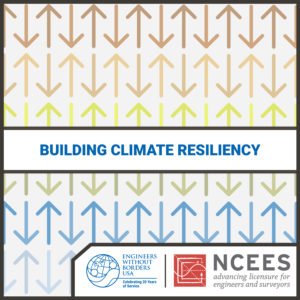
Episode 4: Building Climate Resiliency
In this episode you will hear about our work in building climate resiliency around the world through community engineering.
Licensure information brought to you by the National Council of Examiners for Engineering and Surveying (NCEES), a proud partner of EWB-USA.
